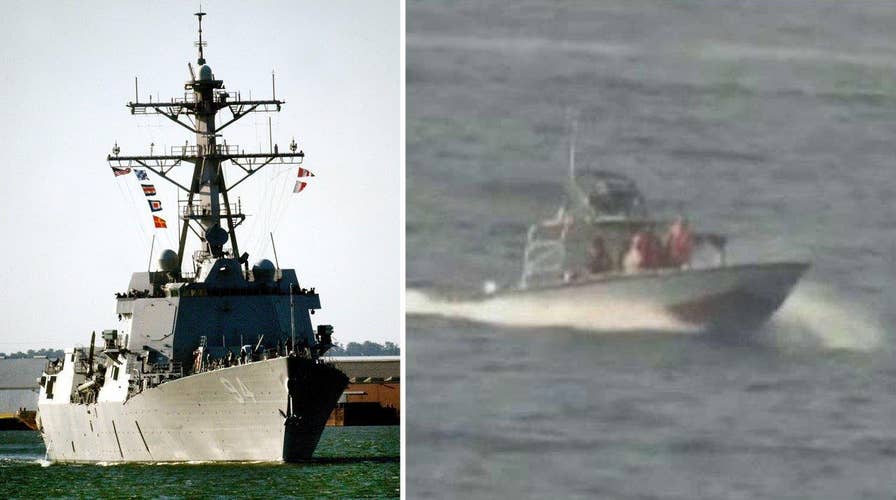Dangerous confrontations between US, Iran ships soar
Provocative interactions nearly doubled in first half of 2016; Amb. John Bolton weighs in on 'America's Newsroom'
Dangerous confrontations between Iran and the U.S. Navy are becoming even more frequent than previously estimated, Fox News has learned.
According to new data shared Monday with Fox News by a U.S. defense official, the number of provocative interactions between Iranian vessels and the U.S. Navy in the Persian Gulf nearly doubled in the first half of 2016 compared with the same time period a year ago.
“In the first half of 2016, we have seen nearly twice as many unprofessional and/or unsafe interactions when compared to the first half last year. That's a disturbing rise and it has continued into the second half of the year,” said the official, who requested anonymity because he was not authorized to speak on the record.
In the first half of 2016, there were 19 dangerous interactions with the Iranians, which the U.S. Navy characterized as “unsafe and unprofessional.” In the first half of 2015, that number was 10, according to the official. The Iranian vessels acted as the aggressors every time, according to the U.S. Navy.
The account follows a Fox News report on Friday citing estimates that such confrontations are up more than 50 percent this year.
The defense official, though, said Monday the U.S. Navy had gone through its numbers over the weekend and reclassified some of them. (U.S. Central Command had issued a statement in July saying there were 26 dangerous interactions in the first half of 2016.)
The new numbers show an even sharper rise in the first half of the year, though the number itself is lower than Central Command first estimated.
Further, since July, there have been 11 dangerous confrontations, according to the data, in a sign of increasing Iranian aggression in the Persian Gulf and Strait of Hormuz. There were four such encounters with Iran last week alone, including one that required warning shots from a U.S. Navy ship.
In total, there have been 30 dangerous interactions with Iran so far this year, amounting to more dangerous dealings with the Iranians in eight months than all of last year. In 2015, 24 “unsafe interactions” with the Iranians were recorded, according to the official.
This comes despite the highly touted nuclear accord, as well as a recent $1.7 billion U.S. payment to Tehran in January.
Iran’s increasingly aggressive behavior is expected to come up Tuesday when the U.S. commander for American forces in the Middle East, Gen. Joseph Votel, briefs reporters at the Pentagon.
Over the weekend, there were more signs of Iran’s increasingly aggressive military behavior.
On Sunday, Iran announced via its state TV that it had deployed the Russian S-300 missile system around its nuclear facility in Fordow, a previous uranium enrichment site. According to the nuclear agreement, Fordow is no longer permitted to enrich uranium, but can only be used for civilian research.
Last week, one of the four incidents of provocative Iranian behavior was filmed by the U.S. Navy.
The video showed four Iranian gunboats from its Revolutionary Guard Corps coming within 300 yards of USS Nitze, an Arleigh Burke-class destroyer. The U.S. destroyer fired flares, increased speed and took evasive maneuvers, while the Iranian ships ignored calls on the radio to stop. William Urban, a spokesman for the Navy’s 5th Fleet, called the actions as “unsafe and unprofessional.”
The next day, in a separate incident in the northern Persian Gulf, a U.S. coastal patrol ship fired three warning shots from its .50 caliber machine gun when one Iranian ship came within 200 yards.
In January, Iranian gunboats from its Revolutionary Guard Corps also seized 10 U.S. Navy sailors after their two patrol craft drifted into Iranian waters near Farsi Island in the Persian Gulf. They were released the following day.
This week, Iranian Defense Minister Hossein Dehghan said his warships would continue to confront any U.S. Navy ship near Iran’s territorial waters.
“If an American ship enters Iran’s maritime region, it will definitely get a warning. We will monitor them and, if they violate our waters, we will confront them,” he said according to the Iranian Students’ News Agency.
Asked to respond to Dehghan’s comments at a press briefing Thursday, Pentagon Press Secretary Peter Cook responded, “[W]e certainly hope it doesn't continue, because it serves no purpose other than to raise tensions in an important part of the world; and tensions that we don't seek to have escalated.”












































